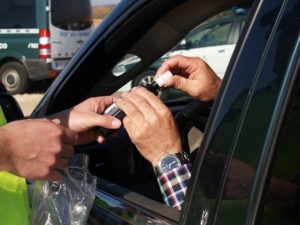
If you are pulled over in your vehicle on suspicion of driving while intoxicated, the police officer may demand that you submit to a preliminary breath test (PBT). Unlike the larger and more accurate Datamaster machines at the police station, the PBT is a portable device that can be administered on the roadside to make an initial determination if alcohol is present in the driver’s system. If the driver is positive for alcohol, then the results can contribute to probable cause for the police officer to make an arrest. Does the driver have a right to refuse to take the PBT? What are the consequences if the driver does refuse?
Under MCL 257.625a(2), a police officer may require a person to submit to a PBT and who has reasonable cause to believe that a person was operating a vehicle upon a public highway or other place open to the public or generally accessible to motor vehicles, including an area designated for the parking of vehicles, and ANY OF THE FOLLOWING:
- That person by the consumption of alcoholic liquor, a controlled substance, or other intoxicating substance or a combination of them may have affected his or her ability to operate a vehicle.
- That person was operating a commercial motor vehicle within the state while the person’s blood, breath, or urine contained any measurable amount of alcohol, a controlled substance, or any other intoxicating substance.
- That person was under age 21 and operating a vehicle within the state while the person’s blood, breath, or urine contained any measurable amount of alcohol, a controlled substance, or any other intoxicating substance.
A police officer may arrest a person based in whole or in part upon the results of a PBT. MCL 257.625a(2)(a). A preliminary breath test is NOT admissible at trial by the prosecutor to establish the defendant’s guilt for an operating while intoxicated or operating while visibly impaired offense. However, the PBT may be admissible during a criminal prosecution for one or more of the following purposes:
- To assist the court or hearing officer in determining a challenge to the validity of an arrest (e.g. preliminary examination, motion to suppress, bond hearing, etc.). MCL 257.625a(2)(b)(i).
- As evidence of the defendant’s breath alcohol content, if offered by the defendant to rebut testimony elicited on cross-examination of a defense witness that the defendant’s breath alcohol content was higher at the time of the charged offense than when a formal chemical test was administered as required under the implied consent laws. MCL 257.625a(2)(b)(ii).
- As evidence of the defendant’s breath alcohol content, if offered by the prosecution to rebut testimony elicited on cross-examination of a prosecution witness that the defendant’s breath alcohol content was lower at the time of the charged offense than when a formal chemical test was administered as required under the implied consent laws. MCL 257.625a(2)(b)(iii).
While the PBT is not admissible at trial for operating while intoxicated or operating while visibly impaired, it is admissible in cases involving offenses other than drunk driving. People v Tracy, 186 Mich App 176; 463 NW2d 457 (1990). For example, a prosecutor may introduce a preliminary breath test at a trial for possession of a weapon under the influence. People v Booker, __ Mich App__ (No. 329055, issued February 18th, 2016). The PBT may also be the basis for a police officer to obtain a search warrant.
A person who refuses to submit to a preliminary breath test upon the lawful request of a police officer is responsible for a civil infraction punishable by a fine up to $100.00. MCL 257.625a(3). The refusal to take a PBT does NOT trigger the same license sanctions that a person would face if refusing a chemical test with the Datamaster at the police station or a blood test. The PBT is not covered under Michigan’s implied consent statutes and is limited to a civil infraction only.
However, a person operating a commercial motor vehicle who refuses to submit to a preliminary breath test upon the lawful request of a police officer is guilty of a misdemeanor punishable by a fine up to $100.00 or up to 93 days in jail, or both. MCL 257.625a(5). In addition, the commercial motor vehicle driver will be issued a 24-hour out-of-service order.
A driver who submits to a PBT may be giving the police officer the evidence they need to make an arrest when it would not otherwise be available under the circumstances. Therefore, it is often a good decision to refuse to take the preliminary breath test if you had been drinking alcohol or consuming drugs. Declining to take the test will only cost you $100.00. However, if you are arrested and the police officer requests that you take either the DataMaster breath test or a blood test, then your refusal to submit to these formal chemical tests will result in 6 points and suspension of your license privileges under Michigan’s implied consent laws. A driver should take care not to confuse these two distinct requests to avoid making a big mistake. You should always consult with a lawyer before taking the drastic step of refusing any testing requests made by the police.
If you or a loved one is charged with any criminal offense, do not hesitate to contact the experienced attorneys at Kershaw, Vititoe & Jedinak PLC today.





